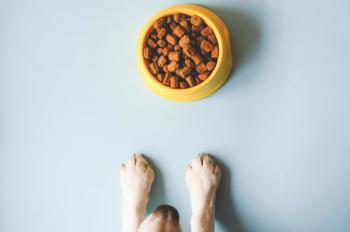
Crawford tapped FDA deputy commissioner
Three issues top newly appointed Food and Drug Administration (FDA) Deputy Commissioner Dr. Lester Crawford's agenda: bioterrorism, "intelligent" staffing and appropriate use of the FDA's whopping $1.6 billion budget.
Three issues top newly appointed Food and Drug Administration (FDA) Deputy Commissioner Dr. Lester Crawford's agenda: bioterrorism, "intelligent" staffing and appropriate use of the FDA's whopping $1.6 billion budget.
Crawford's seven months in "appointment limbo" ended Feb. 25,when the 64-year-old veterinarian and Ph.D was tapped for the No. 2 "pointman" spot at the FDA. Many Washington and veterinary insiders thoughthe would garner the commissioner's spot which has been vacant since January2001. Crawford says he couldn't be happier as deputy commissioner.
Appointed by Health and Human Services Secretary Tommy Thompson andapproved by the Bush administration, Crawford replaces Bernard Schwetz,DVM, acting commissioner. However, the FDA still remains without a commissionersince Dr. Jane Henney vacated the spot last year.
And so the well-seasoned, four-time FDA veteran returns to his 12-hour-plusdays at his Rockville, Md., "home-away-from-home" to assume oneof the most important, and volatile, positions in the U.S. government.
CEO's righthand man
Media outlets have likened Crawford's deputy commissioner post to a chiefoperating officer (COO), or the "No. 2 spot" of a major corporation.
While the commissioner, or corporate-equivalent CEO, maintains a somewhat"ceremonial" post, Crawford says the COO is the details deliverer.
"COO explains (my post) well enough to the industry but it doesn'treally to consumers and professional people, because they don't talk inthose kinds of terms," says Crawford. "The best way to defineit is that the day-to-day operations are managed by this No. 2 person, who'scalled the deputy commissioner."
Until a commissioner is named, Crawford, who works 7 a.m. to 7 p.m.,says his functions include coordinating center activities, such as drugapprovals, and managing the budget and personnel. Managing a $1.6 billionbudget, along with nearly 10,000 staff members alone would be considereddaunting to anyone but Crawford.
"I feel comfortable in that I've done it before," he says.
"When I was administrator of the Food Safety Inspection Service,we had about the same number of people; not that kind of budget, but somethingclose to a billion dollars. Not many people have managed that large of agovernment organization."
No. 1 priority
Prior to Sept. 11, bioterrorism would have fit best in science-fictionthrillers, but today, Crawford says the possibility of it has led FDA andthe government to keep a constant watchful eye on it.
Earlier this year, the FDA received an influx of funds designated forpositions to address bioterrorism and homeland security measures. The extrafunding will enable FDA to increase its staff by about 10 percent, accordingto Crawford.
As FDA regulates about 25 percent of the U.S. economy, Crawford saysit is the role of the agency to be "interested in the security of thoseproducts we regulate and (in) providing expertise to Gov. (Tom) Ridge (director,Office of Homeland Security) and others about other substances he (should)be concerned about.
"If you think about animal feed, or about human food, human drugsand biologics (or) medical devices, there is opportunity for mischief byterrorists. It's our job to make sure that doesn't happen."
First undertaking
Nearly a week into his FDA position, Crawford gave his first Congressionaltestimonial hearing on the Prescription Drug User Fee Act, which chargesdrug companies a fee to get their drugs and biologics reviewed.
"It gives us a lot of funds and high-level personnel to make surewe don't cause a drug lag," explains Crawford. "In other words,when a breakthrough drug comes on the market, we have to have the resourcesto expeditiously approve it."
So far, user fees, as they're called, extend only to biologics, humanbiologics, bio-engineered products and human drugs. But serious interestby some parties may have a case for fees for veterinary drugs. Already,groups such as the Animal Health Institute are mulling options for futurefees, says Crawford.
"We believe, based on what we've seen with the Prescription DrugUser Fee Act, that user fees have a place in making these organizationsfunction better," he says.
"It has to be some sort of consortium between the agency, Congress,the industry, consumer organizations and so forth. But generally, with humandrugs and human biologics, all the stakeholders are enthused about the prospects.And of the congressmen at the hearing, virtually every member endorsedthe reauthorization. Obviously this is extremely popular politically andalso societally."
Ongoing challenge
"Intelligent" staffing tops Crawford's list of FDA challenges.
"You can't increase your staff by 10 percent this day and time veryeasily. You have to be very sure these people are what you want, that they'rereally enthused about regulatory science and that the mechanism is put inplace to the extent possible that every one of them will be a winner."
The last concern is assimilating appropriate funding in an intelligentmanner, says Crawford.
"When you get past the usual things you think about in FDA, thenext thing would be the management of all this extra funding - funding we'veneeded for a long time, and (that) we certainly need after September 11,"he says. "We've got to do it very intelligently."
He adds, when the Congress disposes of such significant funding, theywill expect justification for its use.
In Crawford's opinion, asking whether the FDA is funded adequately isnot a trick question, "but the answer is a trick.
"We're not allowed to say whether we are or we aren't." Adequatemanpower is classified too, says Crawford, laughingly adding, "We justhave to thank the Congress."
Lagging drug approvals
To say that drug approvals are lagging is not a fair assessment, saysCrawford, at least on the human drug side. "The testimony we gave (PrescriptionDrug User Fee Act) shows that we are approving more," contends Crawford.
"No more (drugs) are coming off the market because of adverse effectsthan was the case before we got these user fees. We actually presented figuresto show that we are doing far better than Europe in human drugs.
"As a matter of fact, somewhere between 50 and 70 percent of thenew drugs that are approved in the world are approved here first. That meanswe have a better drug armamentarium. And we also have better public healthas a result. Some of these drugs are very serious interveners of fatal ornear-fatal diseases, so it is a big success story."
Crawford says he has not yet had a chance to seriously assess the veterinarydrug approval process, nor the other categories' approval processes.
"My intuition is that things are going well there, but I have totell you that I haven't really focused on those because of this hearing.But I will" he adds.
Veterinary drug shortage
Whether there is a shortage of veterinary drugs has yet to be determined,according to Crawford.
He adds, "I've read DVM Newsmagazine to keep up with those things,but I don't really know in the same sense," whether such a shortageexists at this time. He has not yet discussed the matter with the Centerfor Veterinary Medicine.
Antibiotics hits
The likelihood for veterinary medicine to lose drugs because of antibioticresistance issues is one that Crawford would not deny. Although he sayshe does not know whether losses will be significant, for now the plan appearsto be to "go after those one at a time.
"I doubt that our armamentarium, as we say, is going to be severelycompromised, but I do think they're serious about antibiotic resistanceand not shy from taking the appropriate action. Those who are likely tocompromise human therapy or other veterinary therapy should be on guardbecause they are being looked at."
He declined to comment on whether off-label drug use might also inhibitfuture drug approvals.
Public relations
The rapport FDA shares with consumer protection groups is, at the veryleast, one of respect. "They're certainly part and parcel of what wedo," Crawford says.
"In terms of me personally, you're not always going to agree witheach other, but they have a role in this world for sure. They make us andthe world better, as do the opposing forces. I have to be deputy commissionerfor all the people. That sounds trivial and trite, but it's true. You can'tallow yourself to get mad at anybody."
That even-keeled temperament applies to the President, of whom he isvery fond, and Congress, which prompts laughter.
"Things started off pretty (well). I hope it lasts a long time."
Crawford's few good men
Crawford names three wise men as his most influential mentors.
His first choice: Dean Richard Talbot, one-time dean at the Universityof Georgia, while Crawford was associate dean, who later founded the Virginia-MarylandRegional College of Veterinary Medicine. He also founded veterinary informaticsin the 1960s before the advent of computers.
"Talbot was a broad thinker and also - it's probably a contradictionin terms - the nearest thing to a gentleman I have ever seen with a DVMdegree," he says.
Talbot was later chosen to head up the new FDA drug approval process.He died in a tragic Pittsburgh plane crash in 1996.
Crawford's second mentor was neurophysiologist Don Kennedy, Ph.D., hisfirst boss at FDA, who later became president of Stanford University andis now editor of the journal, Science.
"He ran FDA like nobody had before or since in my view," saysCrawford. "I went on a famous trip with him to the North Carolina turkey-growingareas. Born in New York City, he got all his degrees at Harvard, joinedStanford faculty and had never seen a turkey alive. I learned a world abouthim and his devotion to FDA was almost saintly. There was nothing he wouldn'tdo, no amount of stamina he wouldn't summon in order to get it done."
Crawford's third pick: the late Don Huston, DVM, who, for nine years,preceded Crawford at the Food Safety Inspection Service at USDA, beforeleaving to join APHIS.
"He set the record for the highest award that civil service employeescan get - the Presidential Rank award. He got it three times under threeadministrations. Nobody's ever (done that)."
Veterinary vision
Crawford's days on a dairy farm subtly dictated his love for animalsand veterinary medicine by the time he was 5. But by age 11, his interestwas leaning toward a nontraditional mode of practice. He became very interestedin drugs, more specifically, the package directive inserts that drug companieswould write.
"When I was 11 or 12, I used to read those inserts. It was likea pharmacology course. I kept reading them and reading them and thoughtI wanted to do something like that." He later went to work for a drugcompany whose inserts he used to pore over.
He adds that in this profession, "you have to be open to non-traditionalthings. A lot of veterinarians and physicians are not, and that's all right,because they're having a world of fun. A veterinary degree is extremelyuseful, practical, scientific training."
No fear
If President Jimmy Carter had named Crawford deputy commissioner in 1978,when Crawford worked for the agency in a different capacity, he says theposition may have intimidated him.
Not so at age 64, he says. "I've been steadily trying to apply myself.I think I'm ready for it. We shall see."
Did someone say old hat? This position marks Crawford's fourth stintat the FDA, and the sixth presidential administration under which he'llserve. Since the 1960s, the only presidents not to be acquainted with Crawford'sabilities were Presidents Richard Nixon, Gerald Ford and Bill Clinton.
"That's a record - nobody's done that before. It does take a certainamount of experience to able to do it; it's a big job as you well know."
Newsletter
From exam room tips to practice management insights, get trusted veterinary news delivered straight to your inbox—subscribe to dvm360.




